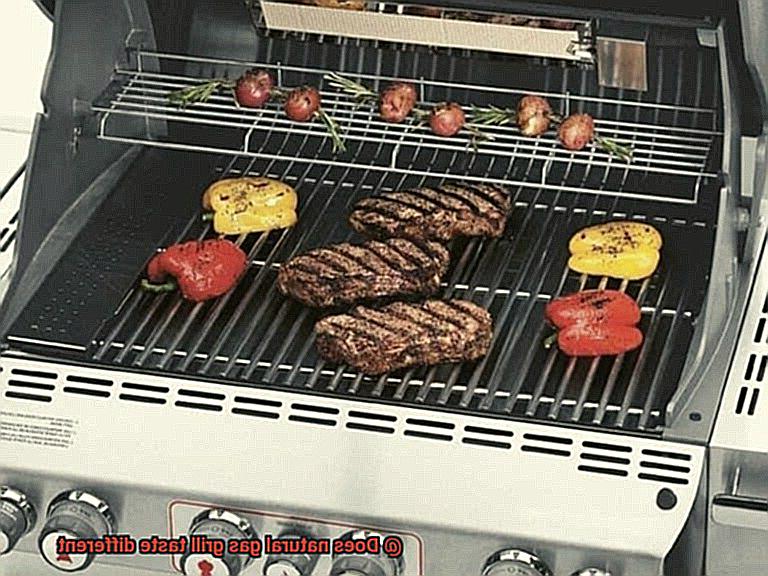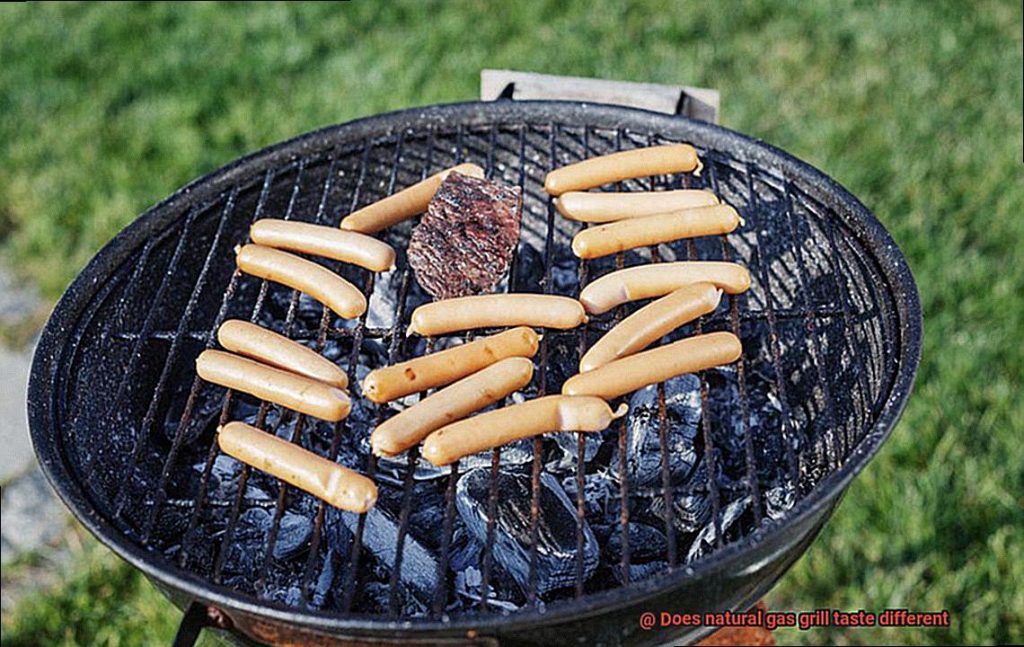Are you a self-proclaimed grill master, who takes pride in cooking up the perfect steak or burger? Have you ever pondered whether natural gas grills produce a different taste than traditional charcoal grills? Fear not, my fellow grill enthusiasts. In this blog post, we’ll be delving into the age-old question of whether natural gas grills taste different and provide all the juicy details.
Natural gas grills have been gaining popularity among homeowners due to their clean fuel source and convenience. But, the million-dollar question remains: can they replicate that smoky flavor we all crave from a charcoal grill?
We’ll be getting down to the nitty-gritty of what exactly gives grilled food its mouth-watering flavor profile and analyzing how natural gas and charcoal grills differ. We’ll also be weighing up the pros and cons of using a natural gas grill and sharing some insider tips on how to achieve that perfect, lip-smacking taste.
So, whether you’re already a die-hard fan of natural gas grills or considering making the switch from charcoal, keep reading to find out if there’s really a difference in taste and how to make your grilled food sing with flavor.
Contents
What is Natural Gas?
Natural gas is a valuable fossil fuel that primarily consists of methane and is extracted from deep beneath the earth’s surface. It has numerous applications, including heating homes, generating electricity, and fueling vehicles. When it comes to grilling, natural gas can also be used as a source of energy for cooking food.
One of the most significant advantages of using natural gas grills is their convenience. They are connected to a natural gas pipeline, eliminating the need for propane tanks and ensuring that users never run out of fuel or have to make trips to refill their tanks. Moreover, natural gas is more affordable than propane in most areas, making it a cost-effective option for grilling enthusiasts.
Although natural gas itself does not have any flavor or odor, some gas grills have specialized materials like ceramic briquettes or lava rocks that can add a smoky flavor to the food being cooked. These materials absorb grease and drippings, which vaporize and create smoke that infuses the food with delicious flavor.
It’s essential to note that the taste of grilled food primarily depends on various factors such as the quality of meat, seasonings used, cooking temperature, and cooking time. While some argue that natural gas grills do not produce as flavorful food as other types of grills like charcoal or propane since they burn cleaner, others argue that natural gas grills are better for cooking because they allow for more consistent temperatures and even cooking. This can lead to better overall flavor and texture in the food.
How Does Natural Gas Affect the Taste of Grilled Food?
You may have wondered whether natural gas affects the taste of grilled food. As an expert on the matter, let me share some insights that may surprise you.
Natural gas grills are rapidly gaining popularity among grill enthusiasts, thanks to their convenience and efficiency. However, a common question that arises is whether natural gas affects the taste of grilled food. The answer to this question is multifaceted and depends on several factors.
For starters, natural gas burns cleaner than other fuel sources, such as charcoal or propane. This means that there are fewer impurities and chemicals released during the grilling process, potentially affecting the taste of the food. While this may seem like a positive attribute, it can also impact the smoky flavor that many people associate with grilled foods.
On the other hand, some argue that natural gas grills lack the same level of smoky and charred flavor as charcoal or wood-fired grills, resulting in a less distinctive taste. The Maillard reaction, which creates desirable flavors and aromas in grilled food, occurs when proteins and sugars react with high heat. While natural gas grills can reach high temperatures, they do not produce the same level of char and sear marks as charcoal or wood-fired grills, which can impact the overall taste of the food.
However, it’s important to note that the type of food being grilled can also play a significant role in how natural gas affects its taste. For instance, foods with delicate flavor profiles such as fish or vegetables may benefit from the cleaner burn of natural gas as it allows their natural flavors to shine through without being overpowered by smoky flavors. On the other hand, heartier meats such as steaks or burgers may require more intense heat and smoke to develop their desired flavors.
Ultimately, personal preference and the type of food being grilled will determine whether natural gas affects its taste. While natural gas grills may not impart the same smoky flavor as charcoal or wood-fired grills, they offer a clean burn that allows for the natural flavors of food to shine through.
Pros and Cons of Natural Gas Grills
A natural gas grill might just be the solution you’re looking for. But before you make the switch, it’s important to weigh the pros and cons of using a natural gas grill.
Let’s start with the advantages. First and foremost, natural gas grills are incredibly convenient. With a constant supply of fuel, all you need to do is turn on the grill and start cooking. No more worrying about cleaning up ashes or running out of fuel mid-cookout.
In addition to convenience, natural gas grills are also cost-effective in the long run. While they may have a higher upfront cost than other types of grills, they are more energy-efficient and cheaper to operate. And since natural gas is less expensive than propane, you’ll save money on fuel costs over time.
But the benefits don’t stop there – natural gas grills are also environmentally friendly. They produce fewer emissions than other fuels, making them a great option for those who want to reduce their carbon footprint.
However, there are some drawbacks to consider as well. The main disadvantage of natural gas grills is their lack of mobility. They need to be connected to a natural gas line, which means they can’t be moved around easily like other types of grills. Additionally, if you don’t already have a natural gas line installed in your backyard, installation can be expensive and time-consuming.
Finally, some people argue that natural gas grills produce food with a different taste than charcoal or propane grills. While this is subjective and varies from person to person, it’s worth keeping in mind that some prefer the flavor that comes from other types of grilling methods.
The Impact of Other Factors on the Flavor of Grilled Food
Well, look no further. While the type of fuel used certainly plays a role in the taste of your food, there are numerous other factors that can have a significant impact.
Firstly, let’s discuss the type of fuel. While natural gas grills have gained popularity due to their ease of use and efficiency, many wonder if they produce the same mouthwatering results as traditional charcoal or wood-fired grills. However, it’s essential to note that the flavor of grilled food is not solely determined by the type of fuel used.
Other factors, such as the quality of the meat, marinade or seasoning, cooking temperature and time, and proper ventilation, all play a crucial role in determining the taste.
When it comes to meat quality, investing in high-quality cuts can make all the difference. Next time you’re at the butcher counter, indulge in a more premium cut and savor the enhanced flavors.
Marinades are also key when it comes to flavorful grilled dishes. Whether you opt for a simple or complex marinade, they all serve to enhance the natural flavors of your meat while tenderizing tougher cuts.
Cooking temperature and time are equally essential. While high heat may seem like an efficient cooking method, cooking at a lower temperature for a longer period can lead to more tender and smokier meats.
Finally, proper ventilation is vital when grilling with natural gas. Without adequate airflow, heat and smoke produced by the grill can become trapped, resulting in bland-tasting food. So ensure that there are vents open on both ends of your grill and avoid overcrowding the cooking surface.
Different Types of Grills and Their Flavors
Grilling is an exciting way to cook food, and choosing the right grill can make all the difference in the flavor. As an expert in grilling, I would like to share my knowledge about different types of grills and their flavors.
Gas Grills: Convenience and Versatility
Gas grills are popular because they are convenient to use, heat up quickly, and offer precise temperature control. They use propane or natural gas as fuel, which produces a clean and neutral taste. However, some gas grills come with features that can enhance the flavor of grilled food.
One way to add a smoky flavor to food on a gas grill is by using flavorizer bars or lava rocks. These bars or rocks absorb the drippings from meat and create smoke that infuses the food with a smoky flavor. Another way to add flavor is by using wood chips soaked in water or beer and placing them in a smoker box on the grill.
Despite common misconceptions, gas grills can produce delicious grilled food with unique flavors. The convenience and versatility of gas grills make them a great option for any grilling enthusiast.
Charcoal Grills: Smoky Flavor
Charcoal grills are known for producing a distinct smoky flavor in the food. They use charcoal briquettes or natural lump charcoal as fuel, which burns and releases volatile gases that flavor the food. Charcoal grills require more skill to maintain the right temperature, but the smoky flavor they produce is worth it.
To enhance the smoky flavor, you can use different types of wood chips such as hickory or mesquite. Soaking the wood chips in water or beer before placing them on the charcoal will also produce more smoke and flavor.
If you’re looking for a unique and intense smoky flavor in your grilled food, a charcoal grill is the way to go. The process may be more involved, but fans of charcoal grills will swear by the flavor they produce.

Electric Grills: Healthy Option
Electric grills are powered by electricity and don’t produce any smoke or added flavors like charcoal or gas grills. However, they are an excellent option for those who want to cook healthy meals without added fat, as they don’t require any added oils.
Electric grills are also versatile and can be used indoors or in areas where open flames are not allowed. While they may not provide the same smoky flavor as other types of grills, you can still add flavor by using seasonings, marinades, and rubs.
Tips for Enhancing the Flavor of Grilled Food with Natural Gas
When it comes to grilling with natural gas, some people may be concerned that their food won’t have the same smoky flavor as those cooked on a charcoal or wood-fired grill. However, there are several ways to enhance the flavor of your grilled food when using a natural gas grill. Let’s take a look at some tips that can help you achieve that delicious, mouthwatering taste.
Preheat Your Grill
Before adding any food to your grill, make sure to preheat it for at least 10-15 minutes. This will ensure that the grill grates are hot enough to sear and caramelize the surface of the food, creating those signature grill marks and enhancing the flavor. A hot grill also helps prevent sticking and makes it easier to achieve a juicy and tender texture.
Use Wood Chips or Chunks
If you crave that smoky flavor, consider using wood chips or chunks on your natural gas grill. Soak them in water for about an hour before placing them on top of the grates or in a smoker box. The heat from the grill will cause the wood to smoke, infusing your food with a delicious smoky flavor. Different types of wood provide different flavors, so it’s worth trying out different options to find what works best for your taste buds.
Marinate Your Meat
Marinating your meat is another way to add extra flavor to your grilled dishes. Use acidic ingredients like lemon juice or vinegar, along with herbs and spices, to create a flavorful marinade. Let your meat soak in the marinade for at least 30 minutes before grilling to allow the flavors to fully penetrate.
Experiment with Seasonings and Rubs
Don’t be afraid to mix up your own spice blends or try out some pre-made rubs from your local grocery store. Different seasonings can completely transform the taste of your grilled food, so get creative and try something new. Whether you prefer spicy, sweet, or savory, there’s a seasoning or rub out there for you.
Control Temperature
Temperature control is crucial when it comes to grilling. Use a thermometer to make sure your food is cooked evenly and avoid overcooking or undercooking. This can help preserve the natural flavors of the food and prevent it from becoming dry or tough. Adjust the heat as needed to ensure that your food is cooked to perfection.
Don’t Forget About Salt and Pepper
Salt and pepper are the building blocks of flavor, enhancing the natural taste of meats and vegetables. Don’t be shy with them. Additionally, adding herbs and spices can provide an extra depth of flavor to your dishes.
Popular Recipes for Natural Gas Grills
Shake things up with these popular and delicious recipes for your natural gas grill. As an expert in the field, I’ve compiled a list of mouth-watering dishes that will impress your guests and satisfy your taste buds.
First on the list is the classic grilled chicken. Chicken is a staple on any grill, but cooking it on a natural gas grill takes it to the next level. Whether you prefer chicken breasts, thighs, or wings, marinating the chicken beforehand and grilling it to perfection will result in a juicy and flavorful meal that will have your guests raving.
For all the steak lovers out there, grilled steak is a must-try. A good cut of steak can be grilled to perfection on a natural gas grill. Whether you prefer ribeye, sirloin or filet mignon, seasoning it with salt and pepper and grilling it over high heat can result in a tender and delicious meal that will have everyone coming back for seconds.
If you’re looking for a healthy side dish to accompany your main course, grilled vegetables are the way to go. Vegetables such as zucchini, eggplant, bell peppers, and onions can be sliced and grilled on a natural gas grill for a healthy and flavorful side dish. Drizzling olive oil and seasoning with salt and pepper can add extra flavor to the vegetables and make them irresistible.
Seafood lovers rejoice. Grilled seafood is another great option for your natural gas grill. Shrimp, salmon, tilapia – you name it. Marinating the seafood beforehand and grilling it over medium heat can result in a tender and delicious meal that will transport you to the beach. Serve it up with some grilled veggies for a complete meal.
Last but not least is grilled pizza. Yes, pizza on a natural gas grill. Making pizza on a natural gas grill can result in a crispy crust and melted cheese that will have your guests asking for the recipe. Preparing the pizza dough beforehand and grilling it over medium heat with your favorite toppings can result in a unique and delicious meal that will impress even the toughest critics.
Conclusion
In conclusion, the natural gas versus charcoal debate has been raging on for years, with no clear winner. However, it’s safe to say that natural gas grills offer a different taste experience than traditional charcoal grills. The clean-burning fuel of natural gas produces less smoke and therefore imparts a milder flavor profile to the food being grilled.
But don’t be fooled into thinking that this means your grilled food will lack flavor. In fact, many people prefer the subtle taste of natural gas-grilled food as it allows the natural flavors of the ingredients to shine through. And let’s not forget about the convenience factor – with a simple turn of a knob, you can fire up your grill and start cooking in no time.
To enhance the flavor of your natural gas-grilled food, there are several tips and tricks you can employ. Preheating your grill is essential for ensuring even cooking and developing those delicious sear marks. Adding wood chips or chunks to your grill can infuse your food with smoky flavors without overpowering it. Marinating your meat or experimenting with seasonings and rubs can add depth and complexity to your dishes.
Ultimately, whether you prefer the bold flavors of charcoal or the subtle nuances of natural gas is a matter of personal preference. But one thing is for sure – with these tips in mind, you’ll be able to create delicious grilled meals on your natural gas grill that will impress even the most discerning palate.






